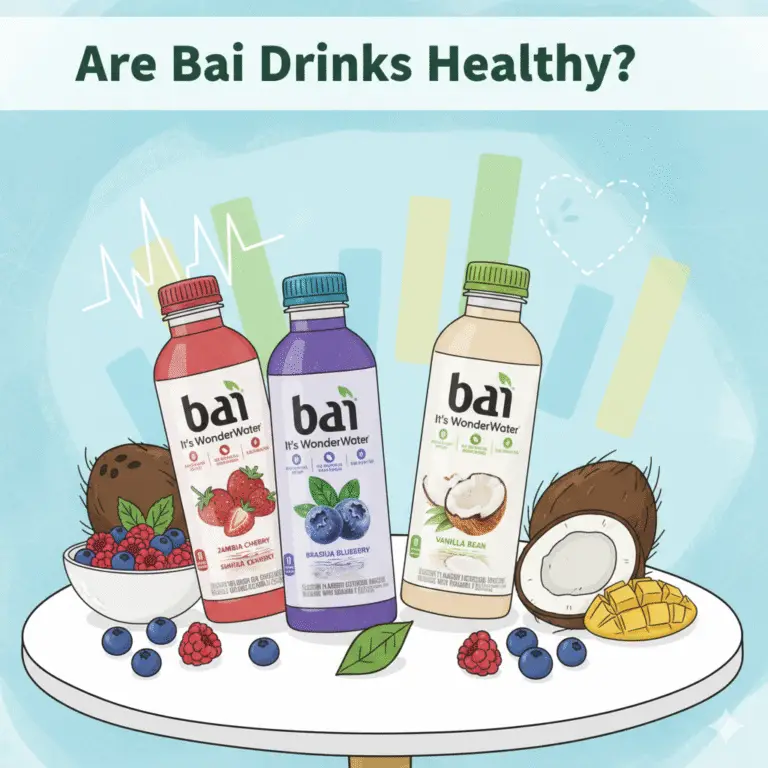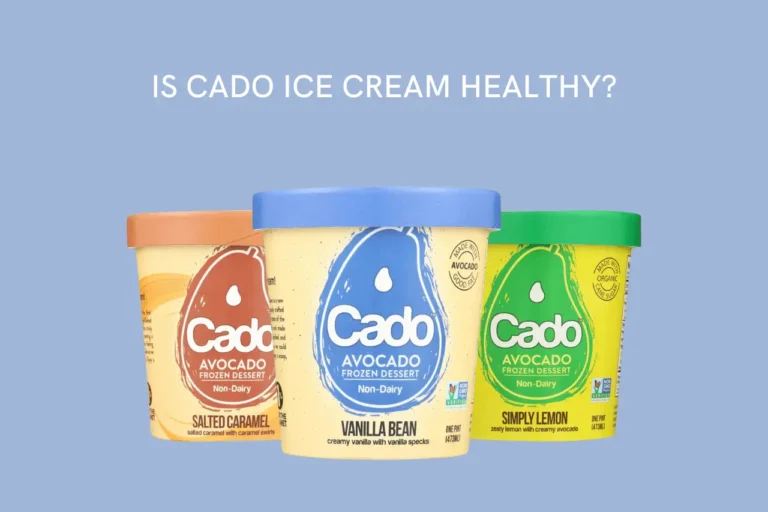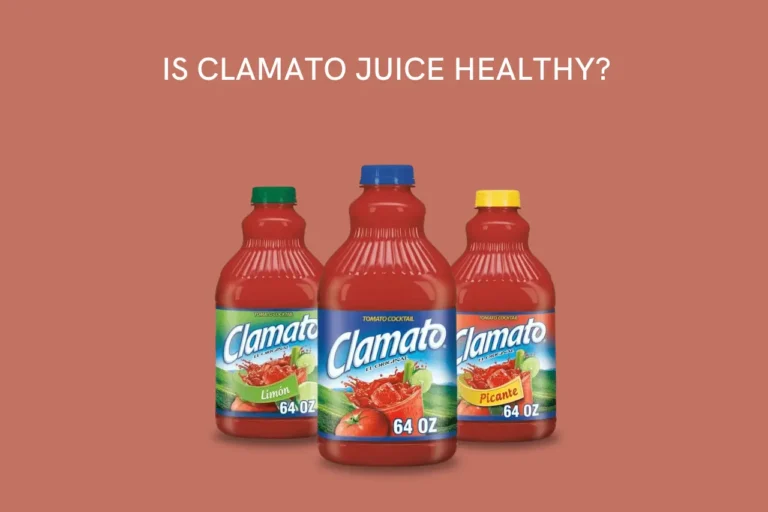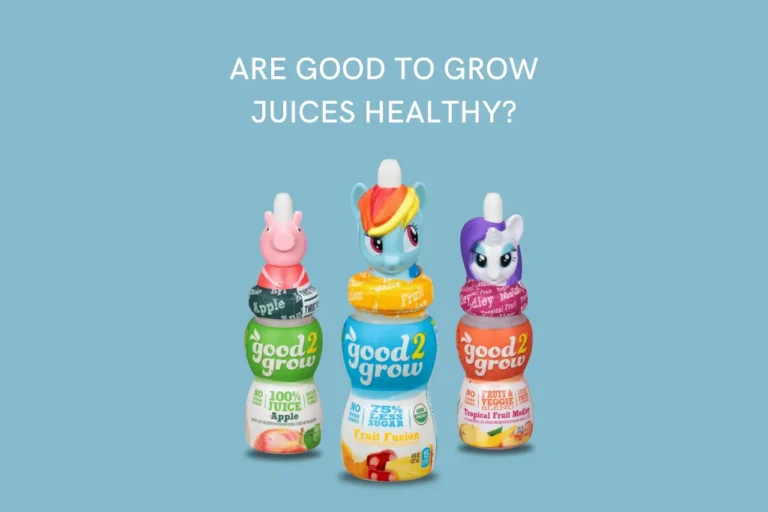We Indians have a deep affection for everything that is instant. Whether it is instant delivery, instant money transfer, or instant noodles. And this is the reason why India is the fourth-biggest market for instant noodles.
There are many instant noodles brands in India, one of which the most popular that many enjoy is yippee noodles. While the yippee noodles is quick, delicious and easy to make, is it good for your health?
The answer is No.
From main ingredients as maida to high in saturated fat and packed with chemical additives, there are several reasons why yippee noodles is not good for your health.
In this post, I have compiled a list of 6 reasons why yippee noodles is bad for your health.
But before that, let’s look at its ingredients and nutritional value.
Also read: Is Maggi Good For Your Health? Here’s What Research Says
Ingredients in yippee noodles
The key ingredients in yippee noodles include Refined wheat flour (maida), Refined palm oil, Iodized Salt, Wheat gluten, Thickeners, Stabilizers, and Acidity regulators.
Let’s know more about each of the ingredients:
Refined wheat flour
Refined wheat flour or maida is the main ingredient in yippee noodles. More than 75% of the yippee noodles is made up of maida.
Refined palm oil
It is a type of oil that is extracted from the fruit of the oil palm tree. It has 53% of saturated fat and is cheaper than other types of oil.
Iodized salt
It is a type of salt that has been treated with iodine. Iodine is added to salt because it is a cheap and easy way to get iodine into the diet. Iodine deficiency is a problem in many parts of the world, and iodized salt is one of the most effective ways to prevent it.
Thickeners
These ingredients are added to noodles or other foods to improve their texture and mouthful and make them more slippery. The two common thickeners used in yippee noodles include Potassium chloride (INS 508) and Guar gum (INS 412).
Stabilizers
These are man-made chemicals that are added to food products to help improve their texture, shelf life, and overall quality. The four common stabilizers used in yippee noodles include:
- Calcium carbonate (INS 170)
- Disodium hydrogen phosphate (INS 339)
- Tetrasodium diphosphate (INS 450)
- Sodium polyphosphate (INS 452)
Acidity regulators
These chemicals are added to food products to control acidity levels and preserve them from spoiling. The three common acidity regulators used in yippee noodles include:
- Potassium carbonate (INS 501)
- Sodium carbonate (INS 500)
- Citric acid (INS 330)
Nutrition value of yippee noodles
The 100gm serving of yippee noodles has the following nutritional value.
- Calories: 459
- Carbohydrates: 62gm
- Sugar: 3gm
- Protein: 9gm
- Fat: 20gm
- Calcium: 128mg
- Iron: 2.6mg
- Sodium: 1247mg
Also read: Is Atta Maggi Healthy? Find Out The Truth!
6 Reasons yippee noodles is not good for your health
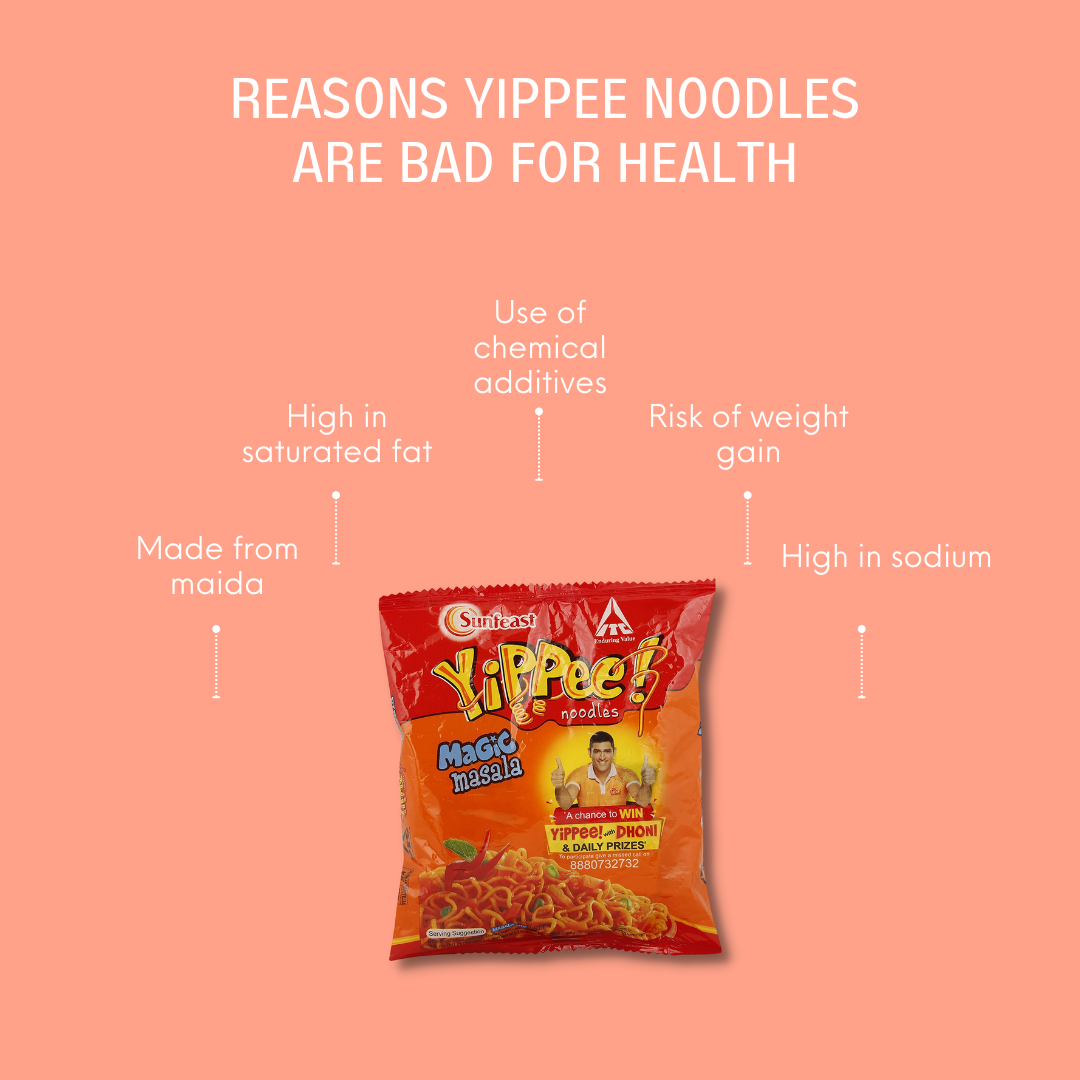
Made from refined wheat flour
One of the biggest reasons yippee noodles is not good for your health is that it is made of maida.
Maida is made by removing the bran and germ from wheat grain, which leaves only the endosperm. This endosperm is then milled to a fine powder, resulting in maida flour.
Due to its high refining process, maida becomes high in calories and contains very little nutritional value. Moreover, consumption of maida-based products has been linked to many health problems such as:
- High risk of diabetes
- Elevated blood sugar levels
- Weight gain
- Digestion issues
- High cholesterol
- Weak bones
- Mood swings
High in saturated fat
While fats are an important energy source for your body, eating too much saturated fat (also called bad fats) can be bad for your health.
Yippee noodles contain palm oil, the main reason for its high saturated fat. It has 11gm of saturated fat in a 100gm serving, about 80% of the daily recommended by the American Heart Association.
Eating food products containing too much saturated fat can increase your “bad” cholesterol levels and can put you at increased risk of heart disease.
Additionally, foods high in saturated fats are more likely to lead to excessive fat and weight gain.
High in sodium
Yippee noodle has high levels of sodium-containing 1247mg per 100gm serving. This equals 50% of the daily recommended sodium. Then you may also be getting sodium from other foods you eat throughout the day. This may overload your diet with too much sodium.
While having some sodium in your diet is important, too much can lead to many health conditions such as high blood pressure, stroke and heart disease.
Therefore, limiting your intake of foods high in sodium is essential.
Risk of weight gain
The combination of maida with saturated fat and high sodium levels in yippee noodles is a perfect storm for packing on the pounds.
Eating maida slows down the metabolic rate of your body. As a result, your body stops burning fat and instead start storing them. While on the other hand, consuming too much sodium can cause fluid retention resulting in weight gain. And if you continue to consume, it can also lead to obesity or diabetes in the long run.
Therefore, if you are concerned about your weight, it is important to avoid or limit your intake of yippee noodles.
Use of chemical additives
The use of chemical additives in food products is common. From thickeners to stabilizers to acidity regulators, food companies use every additive they can to improve texture and taste.
While these additives are approved by food authorities, they provide zero nutritional value and can be detrimental to one’s health.
If you are someone who is looking to eat healthy, limit foods containing additives. Also, it’s best to avoid additives if you are suffering from any chronic disease, such as diabetes, obesity, or inflammation.
Not gluten-free
Yippee noodles is not gluten-free, so if you are someone with gluten sensitivity or celiac disease, it’s best to avoid its consumption.
Final words
Yippee noodles is not good for your health as it is made from maida, is high in calories and has high levels of saturated fat and sodium.
So should you ditch it completely from your life?
While ditching it completely may not be possible for some people, eating in limited amount such as one or two times a week is fine.
But if you want to eat clean or suffering from chronic disease it’s best to avoid it completely.
Also, you can also look out for healthy noodles brands in India.
Found this information helpful? Share it with the world.
Meanwhile here are a few other posts that might be helpful for you.
- Is Saffola Masala Oats Healthy? A Detailed Breakdown
- Is Boost Good For Health? The Pros And Cons You Need To Know
- Is Parle G Good For Your Health? The Answer Might Surprise You
- Is Sting Energy Drink Good For Health? Everything You Need To Know
FAQs
A 100gm serving of yippee noodles contains 459 calories.
No, yippee noodles is not better than maggi. In fact, neither of them are good for your health as they both contain high levels of maida, saturated fat and sodium.
While Yippee noodles may be delicious, they are not a healthy option for your kids. This is because they contain maida and other additives that can lead your child’s health towards overweight, obesity or diabetes at a very early age.
Yippee noodles contains large amounts of maida, which has a high glycemic index. This can cause sharp rises in blood sugar levels, which can be dangerous for diabetics and lead to serious health complications.
Pregnancy is a time when women must be extra careful about their diets, as the food they consume can have a profound impact on their baby’s health. Eating maida based food like yippee noodles is not a good idea.

